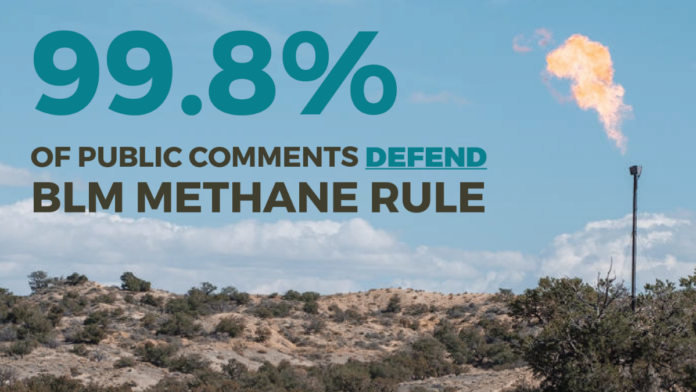New restrictions on oil and natural gas development on federal lands – imposed at the last-minute by the outgoing Obama administration – must be overturned, New Mexico Gov. Susana Martinez (R) said.
In a Jan. 27 letter obtained by Western Wire, Martinez endorsed the repeal of the U.S. Bureau of Land Management (BLM) “venting and flaring” rule, which has received early attention from federal lawmakers as part of a broader push in Congress for regulatory reform.
The regulation has also proven controversial in New Mexico politics, because the state’s Democratic attorney general is working alongside environmental activist groups and officials from California to save the BLM rule.
The rule targets emissions of methane, the primary constituent of natural gas.
Critics say the BLM rule is not needed because emissions from oil and gas development are already regulated under existing state and federal programs.
The extra red tape will block some wells from being drilled and force others to prematurely shut down due to higher costs, they argue.
“Royalties paid to state and federal governments will decrease, new development on federal lands will stagnate and jobs will be lost if the Venting and Flaring Rule is not repealed,” Martinez wrote in her letter to House Speaker Paul Ryan (R). The fate of the rule – finalized late last year as President Obama was on his way out of office – is “critical to our state,” she said.
“We have the highest percentage of federal lease acres in production, and oil and gas revenue is the single largest source of funding for New Mexico’s budget,” Martinez wrote in her letter to Ryan. “Absent a repeal [of the BLM venting and flaring rule], funding for New Mexico’s schools, roads and healthcare will be dramatically reduced on account of the reduction in revenue generated by the oil and gas industry.”
If the federal government is really concerned with reducing methane emissions, it should cut red tape and approve more pipelines to transport natural gas away from well sites to the markets where it’s needed, Martinez said.
“Insufficient pipeline capacity and gas processing capacity make it difficult for producers to capture and sell as much of their product as possible,” the two-term New Mexico governor said. “The Department of Interior can correct the root causes of venting and flaring events by approving pipeline right-of-ways more efficiently, which will increase pipeline capacity.”
Martinez specifically endorsed the use of the Congressional Review Act (CRA) to repeal the BLM rule.
If supported by a majority of lawmakers in the House and the Senate and approved by the president, a CRA disapproval motion can effectively repeal an agency regulation.
Yesterday, House Resources Committee Chairman Rob Bishop (R-Utah), Senate Environment and Public Works Committee Chairman John Barrasso (R-Wyo.) introduced CRA disapproval motions in the House and Senate aimed at BLM’s “venting and flaring” rule.
The BLM rule was proposed and finalized last year by the Obama administration under pressure from “keep it in the ground” groups that oppose all production of oil, natural gas and coal – and any infrastructure needed to move these energy products to market, including pipelines.
The restrictions on methane emissions are “a positive step” towards ending fossil-fuel production on federal lands completely, according to the Center for Biological Diversity (CBD) and Sierra Club.
CBD and Sierra Club are now defending the BLM rule in court against legal challenges from three Western states – Wyoming, Montana and North Dakota – and industry groups.
New Mexico Attorney General Hector Balderas (D) and the attorney general of California joined the activist groups in defending the rule in court.
New Mexico’s business community, however, supports the repeal of the rule, as Western Wire reported last week.
The majority of natural gas wells in the state’s northwest may be shut down because of the rule, New Mexico Business Coalition president Carla Sonntag warned.
“It doesn’t make economic sense and so the operators are now looking at shutting down these wells,” Sonntag said on a conference call with reporters last week. “New Mexico can’t afford that.”
New Mexico Land Commissioner Aubrey Dunn (R) has publicly criticized Balderas for working with parties from outside the state to save the BLM rule.
As Western Wire recently reported, Dunn is worried the extra requirements of the rule will prevent new wells from being drilled and force some existing wells to close.
It could cut royalty revenues to the state by as much as 25 percent, he said. Every year, the New Mexico State Land Office distributes hundreds of millions of dollars in royalties from energy development on public land to school districts and universities.
“New Mexico is currently faced with a severe budget deficit, and the implementation of this rule could not come at a worse time for states such as ours that are heavily reliant on oil and gas production for a balanced budget,” Dunn told Western Wire. Officials in Washington, D.C. should take “a more common sense approach” to federal lands, and “take into account the economic impacts on oil and gas producing states in the west that rely on hydrocarbon revenue,” he said.
The CRA disapproval motion is scheduled to receive a floor vote in the House on Feb. 3, according to Majority Leader Kevin McCarthy (R-Calif.).

